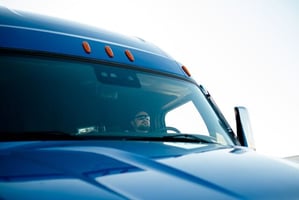Towing in winter isn’t just another drive—it’s a test of preparation, skill, and equipment.
Snow, ice, low visibility, and freezing temperatures all bring new challenges, especially when you're hauling a trailer behind you. But with a smart game plan, you can stay safe, protect your gear, and arrive without stress.
Whether you’re heading out for a winter camping trip or hauling equipment through snowy passes, your trailer setup needs extra attention. From checking tire health to adjusting your driving habits, winter towing requires more than just good intentions—it requires precision.
Many seasoned haulers rely on sway-control systems like the ProPride 3P® Hitch, which delivers unmatched control and stability on slick or windy roads. It’s one of the smartest investments you can make for winter towing safety.
In this blog, we’ll cover:
- How to prepare your vehicle and trailer for winter conditions
- The must-have tools and gear for winter towing emergencies
- Safe winter driving techniques tailored for towing
Preparing Your Vehicle and Trailer for Winter Conditions
Before winter towing begins, your first step should be a deep inspection of your vehicle and trailer. Cold weather intensifies minor issues, turning them into serious risks when you’re far from help.
Tires First, Always
- Switch to winter tires on your tow vehicle if you'll be traveling through snow-heavy areas. They grip better and handle freezing roads more safely.
- Check tire pressure on both the trailer and vehicle—air contracts in the cold, lowering PSI and increasing the risk of blowouts.
- Examine the tread depth and sidewalls for any signs of wear, cracking, or embedded debris.
Inspect Brakes and Lights
- Test trailer brakes using your brake controller. Make sure they engage smoothly and evenly.
- Check that brake fluid is topped off, and inspect the breakaway system.
- Clean snow and ice off trailer lights, then confirm that brake lights, turn signals, and running lights are all fully functional.
Check Fluids and Battery Health
Cold temperatures thicken fluids and reduce battery efficiency. Make sure you:
- Top off antifreeze, windshield washer fluid (winter-rated), and engine oil.
- Test the vehicle battery, especially if it’s more than 3 years old. Replace if it shows signs of weakness.
- Keep jumper cables or a jump starter in the truck—just in case.
Don’t Forget the Hitch & Safety Chains
Wipe off and lubricate your hitch ball to prevent seizing in freezing temps. Make sure safety chains are untangled, strong, and properly crossed beneath the coupler.
Taking the time to prep ensures that your setup performs in icy, unpredictable environments—and gives you peace of mind before every trip.
Essential Winter Towing Equipment and Tools
Even the best drivers can get caught off guard during winter towing. That’s why having the right gear onboard is just as critical as any checklist.
Winter Emergency Kit: Must-Have Tools
- Tire Chains: In some regions, they’re not optional. Carry a set that fits both your tow vehicle and trailer tires.
- Tow Straps: Heavy-duty straps with hooks or loops help you or someone else get unstuck.
- Shovel & Ice Scraper: Compact tools that can save hours if you’re stuck or need to clear buildup.
- Traction Aids: A bag of sand, cat litter, or rubber traction mats helps tires grip on slick surfaces.
- Flashlight & Spare Batteries: LED headlamps are ideal—hands-free and bright for night-time repairs.
- Extra Blankets & Warm Clothing: If stranded, warmth becomes your top priority.
- First Aid Kit: Keep it updated and within reach.
- Portable Phone Charger: A power bank ensures you can call for help even if your battery dies.
Bonus: Spare Trailer Parts
Pack extras of:
- Hitch pins
- Fuses
- Brake controller wiring harness (if detachable)
- Bulbs for trailer lighting
- Breakaway cable clip
When conditions get rough, gear is what separates a minor inconvenience from a major problem.
Adjusting Driving Techniques for Icy and Snowy Roads
Even seasoned towers need to adapt their driving in winter. One wrong move on snow or black ice can send a trailer swaying or jackknifing.
1. Slow Down and Extend Following Distance
The heavier your trailer, the more distance you’ll need to stop. In icy conditions, leave at least 6 seconds between you and the vehicle ahead.
2. Smooth Is Safe
Avoid abrupt steering, accelerating, or braking. Every input should be slow and deliberate. Sudden actions break traction—and you won’t get it back easily on ice.
3. Downshift on Descents
Use lower gears when going downhill to let the engine slow you down. This reduces reliance on brakes, which can lock up on icy roads.
4. Handle Trailer Sway the Right Way
If your trailer starts to sway:
- Ease off the accelerator
- Keep the steering wheel straight
- Avoid braking suddenly
- If you have a brake controller override, tap the trailer brakes manually
The ProPride 3P® Hitch prevents sway before it starts, offering greater peace of mind on slippery highways and during high winds.
5. Watch for Black Ice and Snow Drifts
These hazards often form:
- On bridges
- In shaded road areas
- At night and early morning
Avoid sharp movements in these zones. If conditions worsen, don’t hesitate to pull over at a safe stop and wait it out.
Strategies for Handling Emergencies While Towing
Even with prep and planning, winter towing emergencies can happen. Here’s how to respond smartly.
1. If You Slide Off the Road
- Stay calm. Don’t slam the brakes
- Let off the gas, steer gently in the direction you want to go
- If stuck, shovel around the tires, then use sand or mats for traction
- Try rocking the vehicle forward and back to gain momentum
2. If You Get Stranded
- Stay with your vehicle unless help is visible nearby
- Run the engine in intervals to conserve fuel
- Crack a window slightly for ventilation
- Use reflective triangles or flares so others can see you
3. If the Trailer Disconnects or Swerves
- Don’t brake immediately
- Use your mirrors to assess trailer position
- Allow the trailer to slow naturally
- Pull over as soon as it’s safe
- Recheck the coupler, chains, and hitch system
4. If Visibility Drops Suddenly
- Turn on low-beam headlights
- Slow down and pull into a designated stop if needed
- Avoid using hazards while driving—they reduce brake light visibility
Practicing these emergency responses gives you the ability to stay composed—and in control—no matter what winter throws your way.
Wrapping It Up
Towing in winter isn't just about navigating snow—it's about respecting the conditions and preparing for the unexpected. When you understand how weather affects your setup, drive with caution, and carry the right tools, you turn a risky drive into a safe, confident journey.
Thousands of haulers trust the ProPride to give them the control and stability they need—especially in unpredictable winter weather. It’s not just a hitch—it’s peace of mind when you need it most.
With a reliable setup, smart habits, and preparation, you can tow safely in even the most challenging months of the year.
Frequently Asked Questions
Still unsure about winter towing? These are the questions many new and seasoned towers search for when cold weather hits.
1. Should I drive with trailer brake gain turned up in winter?
Not necessarily. Higher gain can cause trailer tires to lock up. Instead, set the gain just high enough for even braking. Test it at low speed before hitting main roads.
2. Is using cruise control safe while towing in snow?
No. Cruise control reacts slowly on icy surfaces and can lead to skidding or loss of control. Drive manually in winter so you can respond instantly to changing conditions.
3. How do I prevent trailer sway in crosswinds during winter?
Keep speeds moderate and avoid oversteering. A sway-control hitch like the ProPride 3P® stabilizes your trailer, even in strong side winds and slick surfaces.
4. Can salt and slush damage my trailer hitch components?
Yes. Salt accelerates corrosion. After each trip, rinse your hitch, chains, and electrical connections with fresh water and dry them thoroughly to prevent rust and wear.
5. How do I thaw a frozen trailer coupler or lock?
Use de-icer spray or a heat pack (never an open flame). Apply gently and allow the ice to melt. Avoid forceful prying, which can damage the latch or mechanism.
6. Should I check tire pressure more often in winter?
Yes. Cold air reduces PSI significantly. Check tires before every trip—and during long hauls—to maintain traction and reduce blowout risk.


